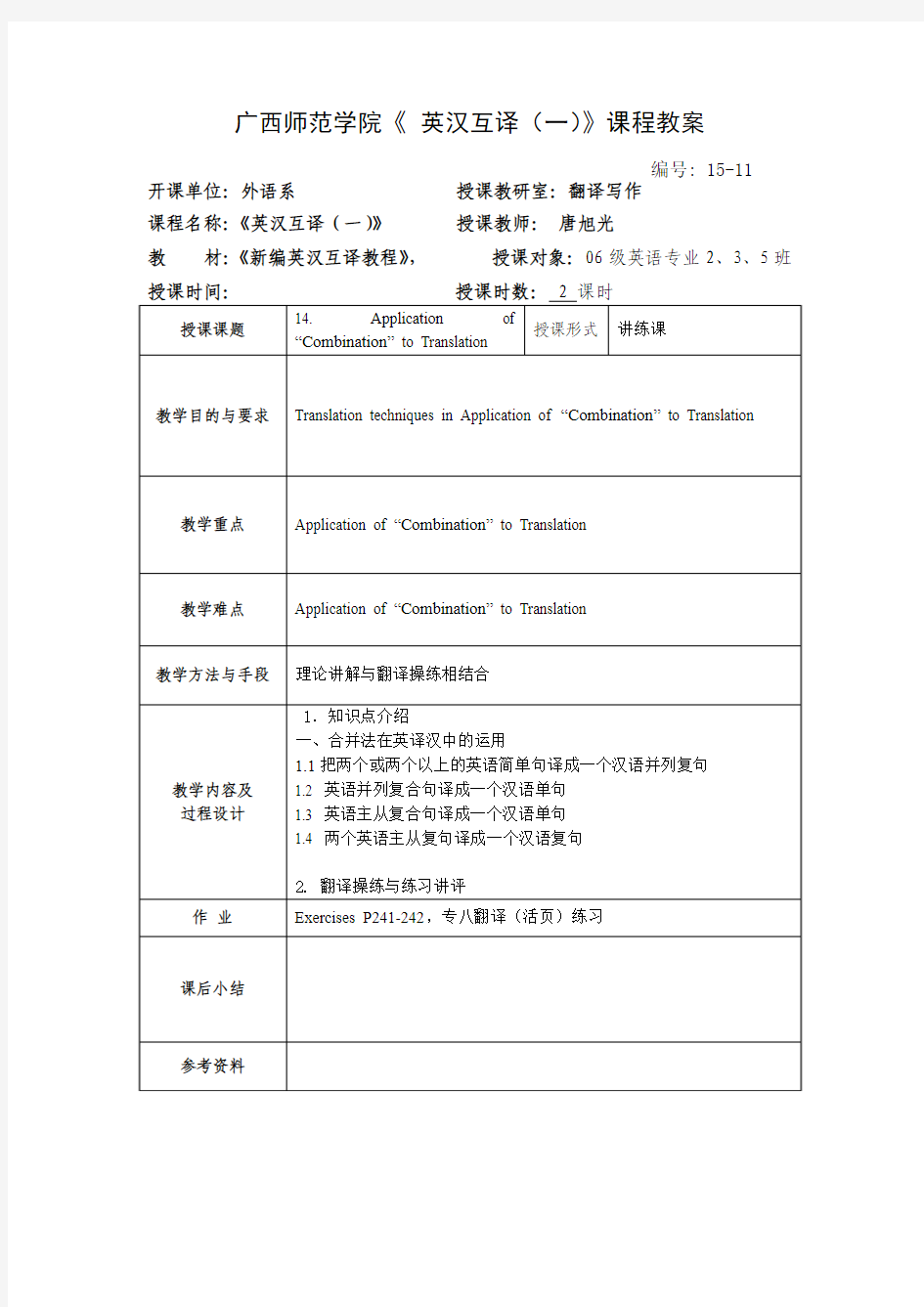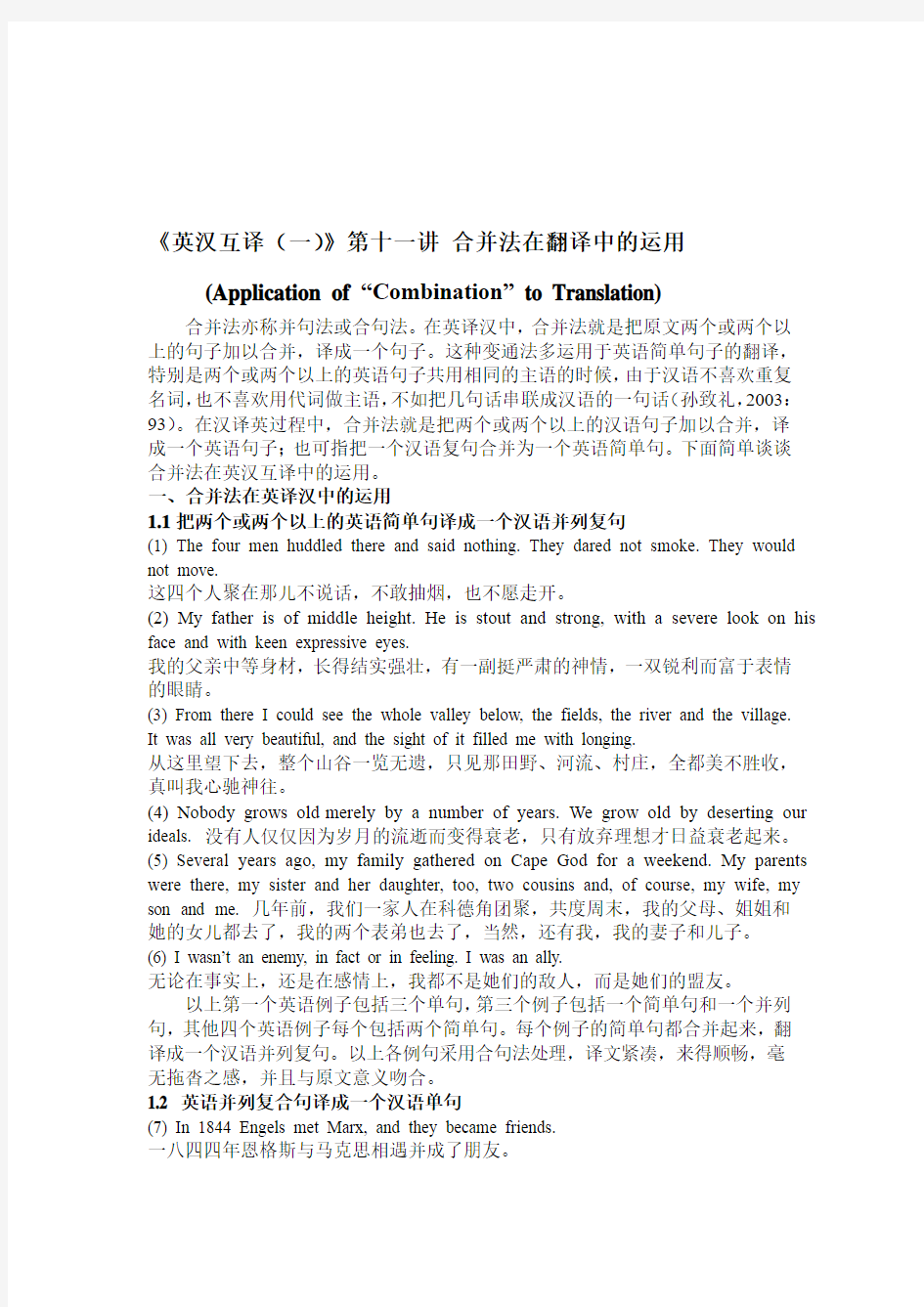广西师范学院《 英汉互译(一)》课程教案


广西师范学院《英汉互译(一)》课程教案
编号: 15-11 开课单位:外语系授课教研室:翻译写作
课程名称:《英汉互译(一)》授课教师:唐旭光
教材:《新编英汉互译教程》,授课对象:06级英语专业2、3、5班
《英汉互译(一)》第十一讲合并法在翻译中的运用
(Application of “Combination” to Translation)
合并法亦称并句法或合句法。在英译汉中,合并法就是把原文两个或两个以上的句子加以合并,译成一个句子。这种变通法多运用于英语简单句子的翻译,特别是两个或两个以上的英语句子共用相同的主语的时候,由于汉语不喜欢重复名词,也不喜欢用代词做主语,不如把几句话串联成汉语的一句话(孙致礼,2003:93)。在汉译英过程中,合并法就是把两个或两个以上的汉语句子加以合并,译成一个英语句子;也可指把一个汉语复句合并为一个英语简单句。下面简单谈谈合并法在英汉互译中的运用。
一、合并法在英译汉中的运用
1.1把两个或两个以上的英语简单句译成一个汉语并列复句
(1) The four men huddled there and said nothing. They dared not smoke. They would not move.
这四个人聚在那儿不说话,不敢抽烟,也不愿走开。
(2) My father is of middle height. He is stout and strong, with a severe look on his face and with keen expressive eyes.
我的父亲中等身材,长得结实强壮,有一副挺严肃的神情,一双锐利而富于表情的眼睛。
(3) From there I could see the whole valley below, the fields, the river and the village. It was all very beautiful, and the sight of it filled me with longing.
从这里望下去,整个山谷一览无遗,只见那田野、河流、村庄,全都美不胜收,真叫我心驰神往。
(4) Nobody grows old merely by a number of years. We grow old by deserting our ideals. 没有人仅仅因为岁月的流逝而变得衰老,只有放弃理想才日益衰老起来。
(5) Several years ago, my family gathered on Cape God for a weekend. My parents were there, my sister and her daughter, too, two cousins and, of course, my wife, my son and me. 几年前,我们一家人在科德角团聚,共度周末,我的父母、姐姐和她的女儿都去了,我的两个表弟也去了,当然,还有我,我的妻子和儿子。(6) I wasn’t an enemy, in fact or in feeling. I was an ally.
无论在事实上,还是在感情上,我都不是她们的敌人,而是她们的盟友。
以上第一个英语例子包括三个单句,第三个例子包括一个简单句和一个并列句,其他四个英语例子每个包括两个简单句。每个例子的简单句都合并起来,翻译成一个汉语并列复句。以上各例句采用合句法处理,译文紧凑,来得顺畅,毫无拖沓之感,并且与原文意义吻合。
1.2 英语并列复合句译成一个汉语单句
(7) In 1844 Engels met Marx, and they became friends.
一八四四年恩格斯与马克思相遇并成了朋友。
(8) The time was 10:30, and traffic on the street was light.
十点三十分的时候,街上来往的车辆少了。
(9) It was 1953, and I had just come from England to seek my fortune.
一九五三年,我刚从英格兰来此找出路。
(10) It was an LST, and it was already nearly loaded with trucks and armed cars.
这是一艘几乎已载满了卡车和装甲车的坦克登陆艇。
上面四例均为英语并列句,都合并起来给译为汉语简单句,言简意赅,非常顺畅。
1.3 英语主从复合句译成一个汉语单句
(11) When you apply for graduate degree courses in Oxford, you should contact University of Oxford directly.
申请牛津大学的研究生学位需要直接与学校联系。
(12) If a student is on a scholarship, he or she may not have to pay HECS.
享受奖学金的学生不必向HECS交费。(注:HECS高等教育捐款计划。) (13) When he was in the 11th grade, my oldest son became a member of the National Honor Society.
我的大儿子在读11年级的时候成为了“全国优秀生协会”的会员。
(14) My first recollection of the magic he could bring to Valentine’s Day came when I was six.
我对情人节的最初印象是我六岁那年他带给我的惊喜。
以上四个英语主从复句经过压缩译成了汉语简单句,译文简单、明白、晓畅、忠实。
1.4 两个英语主从复句译成一个汉语复句
(15) When one is awake, he cannot fix his eyes or his attention constantly on a single object. He must blink, if nothing else.
一个人在清醒时不可能老是盯着或注视某一物体,他至少准会眨巴眨巴眼睛。(16) I never thought that I would eat a food that did not agree with me. Now I meet it whenever I have a meal.
我从来没想到会吃不对我胃口的食物,现在我每次吃饭都遇到讨厌的食物。(17) I am convinced that what we do to children, they will do to the world. It is important that we keep this constantly in our minds.
我相信我们对孩子所做之事,他们以后会交还给这个世界,时常记住这一点是很重要的。
(18) When Strauss ran out of canvas, he wrote his two brothers to send more. He received instead a tough, brown cotton cloth which was made in Nimes, France…
斯特劳斯用完了帆布,便写信要他的两个兄弟再寄一些来,不料收到的却是法国尼姆产的一种坚韧的棕色棉布……
上面列举了四个英语例子,每一个都包含两个主从复句,这两个主从复句合并起来,译成了一个汉语联合复句。译文语气顺畅,意义连贯,与原文意义吻合。
从上述例子可知,英语中两个或两个以上的简单句,两个并列复合句或两个主从复合句都可以采用合并法处理,翻译成一个通顺流畅的汉语句子。值得注意的是,这种变通手法在英译汉中使用得不多见,但在汉译英过程中运用频繁。
计量经济学期末课程论文范文
中国经济增长影响因素实证分析 摘要:改革开放以来,我国的社会主义经济取得了突飞猛进的发展,经济增长速度更是举世瞩目。本文采用经济增长模型和多元线性回归分析方法对1980~2010年中国经济增长因素进行研究,分析了物质资本、劳动力、消费对国内生产总值的影响,建立计量模型,寻求这些变量与中国国民产出的数量关系,进行定量分析,对模型进行检验。 关键词:消费、投资、经济增长、劳动力,实证分析
一、文献综述 (一)经济增长理论 经济增长是指一个国家生产商品和劳务能力的扩大。在实际核算中,常以一国生产的商品和劳务总量的增加来表示,即以国民生产总值和国内生产总值的(GDP)的增长来计算。经济增长是经济学研究的永恒主题。 古典经济增长理论以社会财富的增长为中心,指出生产劳动是财富增长的源泉。现代经济增长理论认为知识、人力资本、技术进步是经济增长的主要因素。 (二)影响因素的分析 从古典增长理论到新增长理论,都重视物质资本和劳动的贡献。物质资本是指经济系统运行中实际投入的资本数量.然而,由于资本服务流量难以测度,在这里我们用全社会固定资产投资总额(亿元)来衡量物质资本。中国拥有全世界近1/4 的人口,为经济增长提供了丰富的劳动力资源。因此本文用总就业人数(万人)来衡量劳动力。居民消费需求也是经济增长的主导因素。 经济增长问题既受各国政府和居民的关注,也是经济学理论研究的一个重要方面。在1978—2008年的31中,我国经济年均增长率高达9.6%,综合国力大大增强,居民收入水平与生活水平不断提高,居民的消费需求的数量和质量有了很大的提高。但是,我国目前仍然面临消费需求不足问题。因此,研究消费需求对经济增长的影响,并对我国消费需求对经济增长的影响程度进行实证分析,可以更好的理解消费对我国经济增长的作用。
发展经济学-新系统-作业题及答案-2012.8
发展经济学-新系统-作业题及答案-2012.8
发展经济学-在线作业_A 一单项选择题 1. 两缺口模式理论认为,如果投资___b____储蓄,则出现储蓄缺口。 (5.0 分) a 等于: b 大于; c 不等于; d 小于; 2. 两缺口模式认为,可以通过以下方式来积极弥补储蓄缺口: b (5.0 分) a 减少出口或扩大进口; b 引进外资。 c 减少投资或扩大储蓄; d 扩大出口或减少进口。 3. 发展中国家大量引入外资的理论依据: b (5.0 分) a 刘易斯二元结构理论 b 两缺口模型; c 贫困恶性循环理论; d 大推进理论; 4. 发展中国家存在着严重的发展不平衡现象,劳动生产率低下,除此以外,发展中国家还存在下述问题: a (5.0 分) a 生活水平低;
b 需求不充足,产品过剩; c 国家对经济采取自由放任的政策; d 文化落后 5. 在边际储蓄倾向和边际进口倾向之和小于__c____的条件下,增加出口有利于提高总需求水平并增加国内就业量。 (5.0 分) a 3。 b 0; c 1; d 2; 6. 如下哪些论点是两缺口模型的结论: a (5.0 分) a 发展中国家可以利用外资解决国内的储蓄缺口; b 发展中国家存在着外汇缺口和GNP缺口; c 外汇缺口的存在一定会产生储蓄缺口; d 发达国家的贸易保护政策产生了发展中国家的外汇缺口。 7. 可持续发展的含义是: a (5.0 分) a 在不牺牲未来几代人需要的情况下,满足我们这代人的需要。 b 一个阶段的发展能够自动生产一个阶段的发展; c 经济增长能够自我维持; d 在发展过程中尽量提高经济增长率; 8. 在经济核算理论中,国民收入增长率大于国民资源(劳动力和资本)投入增长率之差被称为: c (5.0 分) a 劳动剩余; b 储蓄缺口;
政治经济学(社会主义)教案第四讲社会主义社会的经济发展
第四讲社会主义社会的经济发展 【教学目的和要求】帮助学生正确理解现阶段我国经济社会发展战略目标及其确定的依据,并了解“三步走”的战略步骤;了解我国经济发展战略目标的实现程度,从而坚定实现社会主义现代化的信心;加深对切实转变经济增长方式、努力提高经济效益这一战略方针的认识;全面把握实现经济发展战略的主要途径。 【教学重点和难点】 1、我国经济增长方式从粗放型向集约型转变的问题 2、社会主义经济效益的基本理论 3、可持续发展战略 一、我国现阶段的经济发展战略 “经济发展战略”的由来 “经济发展战略”一词的出现,并把它引入经济学,是在第二次世界大战后,首先出现在西方的“发展经济学”中。 早期发展经济学家以美国的罗斯托、刘易斯等为代表,他们提出的经济发展战略主要有:“经济发展阶段论”、“全面大推进战略”、“进口替代战略”、“出口替代战略”、“开放战略”、“稳定和优先发展农业的‘绿色革命’战略”等。 在我国,“经济发展战略”一词最早出现在研究西方经济学的著作中。1981年初,著名经济学家于光远最早提出。到了1982年12月,党的十二大吸收了近2年的研究成果,制定了我国到本世纪末的经济发战略。 〔一〕经济发展战略的基本含义 1、什么是经济发展战略? “经济发展战略”是借用军事科学中的“军事战略”而言的。在军事科学里,“战略”是相对于战术而言的。毛泽东说过:军事战争的战略问题是研究战争全局规律的。同样经济发展战略也是研究经济发展全局的。概括地说: 经济发展战略,是指根据对制约经济发展的主客观条件的估量,从全局出发制定一个较长时期经济发展和人民生活所要达到的目标,以及实现目标的道路和方法。2、经济发展战略的基本内容 经济发展战略包括相互联系的几个方面:战略目标、战略重点、战略步骤、战略方针、战略措施等。其中经济发展战略目标是经济发展战略的中心环节。 关于经济发展战略的内容,有的主张四个方面,即战略目标、战略重点、战略步骤和战略措施;有的认为有三个方面,即略目标、战略重点、战略方针。也有甚至主张九个方面。 我国现阶段经济发展战略的形成过程:
区域经济学课程论文
中国新型城市化道路的选择 摘要 本文从中国城市化的现状及其面临的问题出发,然后结合区域的“城市性”视角,重新理解城市化的深刻内涵,并提出了两条城市化道路:一是人口转移型城市城市化道路,二是结构转换型城市化道路。最后从中国的国情从发,总结出如今中国城市化发展道路的选择,应是走人口转移和结构转型并存的“双轨”发展的新型城市化道路。 关键字:城市化;区域的“城市性”;新型发展道路 一、中国城市化现状 在2013年末中国人口普查时,我国城市化水平已达到53.73%,虽然城镇常住人口超过农村人口,但是仍有约6.5亿农村人口。将来,根据有关专家的推算,中国将来人口的峰值是达到15亿,达到高峰以后人口就开始逐步递减了,即使中国的人口到2020年,中国全面建设小康社会社会目标实现的时候,我们按照城市化65%的城市化来算,那个时候农村还有5.25亿人口,但是这种大趋势是清楚的,现代化体现在城市化,使全体农村都能够过上现代化的生活方式。 此外,我国提出了走新型工业化道路,同样的,城市化也应该走新型道路。但是近十年来,从理论研究和实践操作两个方面看,什么是新型城市化道路,如何走新型城市化道路,严格讲来并没有搞清楚,而城市化却在政府主导下快速发展,部分地区已不同程度地出现了“城市病”。因此,搞清楚什么是新型城市化道路,慎重地选择我国的新型城市化道路,是一个十分紧迫的重大问题。 二、城市化的含义与区域的“城市性” (一)城市化的含义 城市化涉及人口、地理、经济、社会等诸多方面的问题,关于城市化的含义,不同的学科和不同的学者有不同的解释。可以说,城市化是相关学科都极为关注,而含义或定义又最不统一的概念。
发展经济学_在线作业
发展经济学_在线作业_1 交卷时间:2017-11-08 22:12:13 一、单选题 1. (5分)在经济核算理论中,国民收入增长率大于国民资源(劳动力和资本)投入增长率之差被称为: A. 就业不足; B. 余值增长率; C. 劳动剩余; D. 储蓄缺口; 纠错 得分: 5 知识点:发展经济学 展开解析 答案B 解析2. (5分)在边际储蓄倾向和边际进口倾向之和小于______的条件下,增加出口有利于提高总需求水平并增加国内就业量。 A. 0; B. 1; C. 3。 D. 2; 纠错 得分: 5
知识点:发展经济学 展开解析 答案B 解析3. (5分)两缺口模式理论认为,如果投资_______储蓄,则出现储蓄缺口。 A. 小于; B. 大于; C. 不等于; D. 等于: 纠错 得分: 5 知识点:发展经济学 展开解析 答案B 解析4. (5分)经济增长和经济发展的关系是: A. 经济增长是经济发展的一个重要内容。 B. 经济增长是由经济发展促成的; C. 经济增长是产量的增加,经济发展是人均产量的增加; D. 只要经济增长了,也就意味着经济发展了; 纠错 得分: 5 知识点:发展经济学 展开解析 答案A 解析5. (5分)阳光、空气、水分等属于:
A. 生态资源; B. 生物资源; C. 不可再生资源; D. 矿产资源 纠错 得分: 5 知识点:发展经济学 展开解析 答案A 解析6. (5分)在亚洲金融危机中,中国受到的冲击比较小,其主要原因之一是: A. 中国的外债非常少; B. 中国在金融自由化上采取了审慎的政策,将自由化的程度限制在 与金融部门发展相适应的水平下; C. 中国经济的规模足以抵御危机的冲击。 D. 中国意识到金融危机的可能性,提前采取了防范措施; 纠错 得分: 5 知识点:发展经济学 展开解析 答案B 解析7. (5分)纺织业的发展带动了棉花生产,这种现象被赫尔希曼称为: A. 前向联系; B. 后向联系;
一年级数学思维训练教案
一 年 级 数 学 思 维 教 案 执教者: 班级:
第一课:介绍数学 介绍自己 了解学生 教学目标 : 1.了解学生。 2.学生了解数学,培养兴趣。 3.了解学生后,把学生分成2个队伍 教学内容:介绍数学这门课。 课时安排:1课时 教学过程: 1、主要以老师与学生的交流为主。 2、讲趣味数学小故事。 《如果我输了,就做你的夜宵》 “什么游戏?”,小猫很好奇,“快点讲!” “一个简单的数字游戏”,老鼠说,“第一个人说一个1到10的数,第二个人再加一个 1到10的数,先喊到100的人获胜”。 “我先说”,小猫嘿嘿笑道,“你这次输定了。” 第一次,小猫输了。 第二次,小猫又输了。 …… 最后,老鼠得意扬扬地跑了。 沮丧的小猫回到了家. “看吧!早都告诉过你”,猫妈妈说,“学好数学有多重
要!” “那为什么老鼠总能获胜?”小猫疑惑地问到。 小朋友们,你知道答案吗?
第二课:趣味故事 一、故事《棒棒过生日》。 以故事内容激起学生对数的兴趣教学生认识1到10让学生学 会点数即一一对应的识数方法。二、游戏及练习。 1、正确认读10以内的阿拉伯数字指导学生背诵式记数110 2、能从周围生活中发现多种有趣的数字初步了解数字在人们 生活中的实际意义。 3、感受数字的丰富变化体验观察、思考的乐趣。 活动准备: 1、反映故事内容的图片。 2、5组电话号码及5个不同动物的家。 三、活动过程 1、故事《棒棒过生日》引出110的数字。 2、说数字歌找数字。 1像铅笔细长条2像鸭子水上漂。3像 耳朵听声音4像红旗迎风飘。5像秤钩来卖菜6像哨子笛笛 响。7像镰刀割青草8像麻花拧一道。9像勺子来盛菜10像灯 笼挂得 3、做拍手歌游戏。你拍一我拍一,一只孔雀穿花衣你拍二我 拍二,两只小鸭上河沿你拍三我拍三,三只大雁飞上天你拍四 我拍四,四只熊猫吃竹子你拍五我拍五,五只小猫抓老鼠你拍 六我拍六,六只小猴打悠悠你拍七我拍七,七朵红花真美丽你 拍八我拍八,八只青蛙叫呱呱你拍九我拍九,九只公鸡齐步走
发展经济学教案
课题:第一章导论;第二章经济发展的原理; 教学目的:让学员初步了解发展经济学及经济发展的一般原理 重点:发展经济学的研究对象、经济发展的度量、经济发展的协调 难点:经济发展的度量、经济发展的协调 教学过程: 第一章导论 第一节发展经济学的研究对象和任务 一、发展经济学的研究对象 发展经济学:指一个国家或者一个地区,从欠发达状态向发达状态转变的过程。 发展经济学:就是研究发展中国家经济社会结构转型的过程、经济发展趋势、结构变化内在规律和法制因素各种内在关系的科学。 经济发展有三个方面: 一是经济社会结构性的抓边,如城乡人口结构、产业结构、就业结构、社会阶层结构、收入分配结构等等的变化; 二是经济社会质的方面的改善,如生活质量改善,生态环境良好,文化程度提高,人的素质提高,人力资本积累,经济增长注重效益性等等; 三是国民经济量的增长和扩张,如增长速度、人均国民生产总值等指标的变化。 二、发展经济学的任务 发展经济学的任务是:最切合实际地分析发展的一般规律和本国或者本地区的实际情况,把握发展的趋势,指导制定科学的发展思路、发展战略和有关发展的政策,进行科学的投资决策;在长期的过程中,成本最小、时间最短、最节约稀缺资源地完成从经济不发达到经济发达
的过度,即整个社会经济结构的转型。 首先,发展经济学要研究经济发展的一般条件和特殊国情。 其次,发展经济学应当揭示经济发展的一般规律和趋势。 第三,发展经济学还应当从发展中国家的实际出发,探索经济发展道路,制定发展战略和政策。 总之,发展经济学作为一门应用经济科学,必须从发展中国家的具体国情出发,探索实现经济发展的道路、途径和方式,参与选择和制定发展战略。这也是法制经济学的重要任务之一。 概括地说,发展经济学是研究发展中国家从经济不发达状态向经济发达状态演化的条件和规律的科学,是发展中国家制定发展战略的基本科学依据。 第二节发展经济学的结构体系和分析方法 一、发展经济学的结构体系 发展经济学作为研究发展中国家经济发展的一门科学,应当对发展中国家经济状况以及经济发展的一般情况有一个概括的考察和分析。因此,在发展经济学的理论体系中,首先概述经济发展的一般原理,包括发展中国家的性质、结构和特点,经济发展的含义和衡量等等。 整个发展经济学理论的逻辑关系为: 经济发展的一般原理——肌体特征——成长因素——制度因素——结构状态——空间状态——系统开放——动态调控 二、发展经济学的分析方法 首先,发展经济学与西方宏观和微观经济学不同的是,西方宏观和微观经济学研究的是一个时点上或者一个横截面上经济运行的状况,它侧重于一个短期内的资源配置和经济流量问题,因此所用的是静态的分析方法。而发展经济学研究的不是短期经济运行量上的平衡和经济运行结构的均衡和优化,因为从长期来看,一个动态经济系统运行状态的平衡和结构的均衡,实际
金融经济学课程论文
英国脱欧对中国经济的影响研究 摘要:2016年6月24日,英国脱欧公投投票一脱欧派的微弱优势落下了帷幕,虽然英国脱欧还需要两年的时间,但我们依旧需要关注英国脱欧给世界经济以及中国经济带来的影响。本文试图分析英国脱欧对中国贸易投资、人民币以及股市的影响,从而能够进一步理解中国目前的经济政策,同时为中国经济的发展带来一些新的启示。 关键字:英国脱欧贸易投资人民币股市 1 引言 2016年6月23日,英国脱欧公投投票开始,公投结果直接影响英国未来是否留在欧盟。2016年6月24日中午,英国脱欧公投结果落定,“脱欧派”胜出,英国将脱离欧盟。英国脱欧公投由来已久。2013年1月23日,英国首相卡梅伦首次提及脱欧公投。2015年1月4日,英国首相卡梅伦表示,如果有可能,将原计划于2017年进行公投提前举行。2015年5月29日电据外媒28日报道,英国政府向下议院提交并公布了有关“脱欧公投”的议案,包括公投问题的语句,并承诺将在2017年底之前举行投票。英国之所以要脱离欧盟原因有一下几个方面:第一,英国加入欧盟的道路历经坎坷。早在1960年,英国就申请加入欧盟的前身,欧洲共同体,但被法国总统戴高乐否决,在1973年才重新加入欧共体谈判,成为成员国。可加入仅仅两年后,英国就举行了脱欧公投,当然未获通过。1997年,英国首相布莱尔计划在1997年后加入使用欧洲单一货币欧元,遭到当时财政大臣戈登布朗阻止。从这一系列的过程来看,英国于欧盟一直存在一定的矛盾;第二,利益冲突不断加剧。由于历史与地理原因,19世纪晚期以来,英国一直奉行对欧洲大陆事务不干预政策。英国并非欧元区国家,可以发行自己独立的货币,有利保持其出口竞争力,拥有自主的财政政策。但这使英国很难真正的加入欧洲大陆的事务处理。尤其是欧债危机的关键时期,由于各种利益分歧明显,这一传统强国正在逐步丧失其在欧盟中的地位与参与权;第三,英国与欧盟之间相互猜忌,欧盟其他国家民众对英国的“不可靠”也日渐不满,认为英国作为欧盟的一员,在融入欧盟的过程中却表现消极,一直扮演着拖后腿的角色:它不仅否决欧元,不参加欧盟的危机救助方案,不为缓解危机出力,还反对一切金融监管政策,因此英国“出局”对欧盟的发展来说反而是好事,其他成员国在整合过程中受到的阻力会更小。双方的相互信任已经降到历史低点,这种猜忌也表现在英国内部之间,英国内部不仅存在留欧派,也存在脱欧派,认为欧盟的一些政策不仅对欧盟有负面作用,而且也会影响到英国的利益,而欧债危机的蔓延,加剧了两种力量的冲突,加快了英国脱欧的步伐;第四,英国内部的政治投票迫使公投加速进行,英国保守党的支持度一蹶不振,卡梅伦的“脱欧公投”言论或有助于其重新获得部分流向支持脱欧的独立党的选票。卡梅伦亦希望以此作筹码与欧盟谈判,获得对英国更为有利的成员国条件,意图在欧盟内分得更大一杯羹。这四点原因直接导致了英国脱欧公投的发生。 英国脱离欧盟不仅对于欧洲经济有重要意义,同时也影响着中国的经济发展。本文就英国脱欧对中国贸易投资、人民币以及中国股市的影响三个方面来进行研究,希望能更加了解世界经济之间的联系,同时对中国目前的对英经济政策有更好的解读。 2 英国脱欧对中国贸易投资的影响
发展经济学在线作业
发展经济学-在线作业_A 最终成绩:85.0 一单项选择题 1. 两缺口模式理论认为,如果投资_______储蓄,则出现储蓄缺口。 小于; 不等于; 大于; 等于: 本题分值: 5.0 用户得分: 5.0 用户解答:大于; 知识点: 2. 两缺口模式认为,可以通过以下方式来积极弥补储蓄缺口: 引进外资。 减少投资或扩大储蓄; 减少出口或扩大进口; 扩大出口或减少进口。 本题分值: 5.0 用户得分: 5.0 用户解答:引进外资。 知识点: 3. 发展中国家大量引入外资的理论依据: 两缺口模型; 刘易斯二元结构理论 贫困恶性循环理论; 大推进理论;
本题分值: 5.0 用户得分: 5.0 用户解答:两缺口模型; 知识点: 4. 发展中国家存在着严重的发展不平衡现象,劳动生产率低下,除此以外,发 展中国家还存在下述问题: 国家对经济采取自由放任的政策; 生活水平低; 需求不充足,产品过剩; 文化落后 本题分值: 5.0 用户得分: 5.0 用户解答:生活水平低; 知识点: 5. 在边际储蓄倾向和边际进口倾向之和小于______的条件下,增加出口有利于提高总需求水平并增加国内就业量。 2; 1; 3。 0; 本题分值: 5.0 用户得分: 5.0 用户解答:1; 知识点: 6. 如下哪些论点是两缺口模型的结论: 发展中国家存在着外汇缺口和GNP缺口; 发展中国家可以利用外资解决国内的储蓄缺口; 发达国家的贸易保护政策产生了发展中国家的外汇缺口。
外汇缺口的存在一定会产生储蓄缺口; 本题分值: 5.0 用户得分: 5.0 用户解答:发展中国家可以利用外资解决国内的储蓄缺口; 知识点: 7. 可持续发展的含义是: 一个阶段的发展能够自动生产一个阶段的发展; 在发展过程中尽量提高经济增长率; 在不牺牲未来几代人需要的情况下,满足我们这代人的需要。 经济增长能够自我维持; 本题分值: 5.0 用户得分: 5.0 用户解答:在不牺牲未来几代人需要的情况下,满足我们这代人的需要。知识点: 8. 在经济核算理论中,国民收入增长率大于国民资源(劳动力和资本)投入增长率之差被称为: 储蓄缺口; 劳动剩余; 余值增长率; 就业不足; 本题分值: 5.0 用户得分: 5.0 用户解答:余值增长率; 知识点: 9. 凯恩斯经济学从发达资本主义国家的条件出发,把萧条时期的劳动力失业和资本闲置归因于: 市场机制不完善; 储蓄不足;
资源与环境经济学课程论文
资源与环境经济学 课程论文 ——论我国地下水的有效配置 年级学院:2011级经济管理学院 专业班级:农林经济管理1班 学号:201131141712 姓名:赖敏珊
摘要:地下水资源是可耗竭资源且扮演着不可或缺的角色,现在的利用会影响到后代人的可利用水资源,所以,相对于其他自然资源来说,地下水资源的利用更应该得到合理的配置。我国的地下水资源存在着南北不平衡,且开采量在不断地加大,污染也在不断加重等问题,面对这些问题,提出了一些对策。 关键字:地下水资源配置问题对策 1.地下水资源概况 1.1 水资源 水资源是指在一定经济技术条件下,人类可以直接利用的淡水,是自然资源的一个重要组成部分。与其他自然资源不同,水资源是可再生的资源,可以重复多次使用,通过自然界的水文循环和人类的污水处理来使得水资源得到补充和更新全球水储量。地球表面的72%被水覆盖,但淡水资源仅占所有水资源的0.5%,近70%的淡水固定在南极和格陵兰的冰层中,其余多为土壤水分或深层地下水,不能被人类利用。 1.2 地下水资源 地下水资源是指在一定期限内,能提供给人类使用的,且能逐年得到恢复的地下淡水量。是水资源的组成部分。通常以地面入渗补给量(包括天然补给量和开采补给量)计算其数量。因此,地下水资源的开采一般不应超过补给量,否则会给环境带来危害,使生态条件恶化。和其他水资源不一样的是,地下水资源属于可耗竭资源,被开采之后,在相当长的一段时间内都难以恢复。 1.3 我国水资源概况 我国是一个干旱缺水严重的国家。淡水资源总量为28000亿立方米,占全球水资源的6%,仅次于巴西、俄罗斯和加拿大,居世界第四位,但人均只有2200立方米,仅为世界平均水平的1/4、美国的1/5,在世界上名列121位,是全球13个人均水资源最贫乏的国家之一。 扣除难以利用的洪水泾流和散布在偏远地区的地下水资源后,我国现实可利用的淡水资源量则更少,仅为11000亿立方米左右,人均可利用水资源量约为900立方米,并且其分布极不均衡。到20世纪末,全国600多座城市中,已有400多个城市存在供水不足问题,其中比较严重的缺水城市达110个,全国城市缺水总量为60亿立方米。 据监测,目前全国多数城市地下水受到一定程度的点状和面状污染,且有逐年加重的趋
二年级数学思维教案
(此文档为word格式,下载后您可任意编辑修改!) 二年级数学思维第1次教案 年级二年级科目思维训练教师 课题一笔画(一)时间 教、学具准备作业练习本 教学目标1、理解一笔画的特点,知道怎样的连通图可以成为一笔画。 2、让学生在自己动手实验中找到答案,并通过实验的结果, 培养学生的归纳,概括能力。 3、激发学生学习数学的兴趣,培养学生的创新能力和应用 意识。 教学过程设计 1、师画简单一笔画,生观察。说说老师是怎样画的,初步认识一笔画, 2、生自由创作一笔画。 (1)通过看师画,想象并谈谈觉得自己能画出什么来。 (2)自己动手创作一笔画。 3、展示学生作品。 找学生将自己的作品在投影上展示,其他同学当小评委判断是不是一笔画出来的,对于有争议的图形,学生演示其画法,学生再判断,通过判断了解并总结出一笔画时应注意的问题。 通过让学生带着对一笔画的初步认识开始创作,并相互判断作品是不是一笔画出的过程,引导学生动脑筋、动手实验、动口分析,使抽象的概念具体化,化难为易,变抽象为具体,在满足学生自我探索掌握新知的欲望的同时,加深对新知识的印象。 4、判断。 (1)师出示练习题,生先猜想,再自己尝试在练习纸上画,判断是不是一笔画出的。 (2)小组讨论,学生说出自己的判断结果,并在投影上演示画法。
5、简单的一笔画练习。 出示能一笔画出的图形,请学生思考从哪里开始画,并尝试在投影上演示,通过学生找到的不同起点,了解一笔画时找到起点的重要性。 [通过练习,引导学生经历观察、猜想、证明的过程,初步渗透科学研究的方法。进一步巩固新知。] 教学反思改进意见 二年级数学思维第2次教案 年级二年级科目思维训练教师 课题一笔画(二)时间 教、学具准备作业练习本 教学目标揭示一笔画的规则,通过一笔画,培养学生观察、分析 能力。培养学生的空间观念。培养学生的判断推理能力。 会将一笔画问题的解决方法应用于实际。 教学过程设计 (一)共同研究,发现奥秘。 1、学生观察一组简单图形,看看哪个图形可以一笔画?哪个不可以? 2、引导归纳:不连通的图形不能一笔画。 3、介绍“奇点”和“偶点”。 师:我们把与奇数条线相连的点称作奇点。(板书)与偶数条线相连的点称为偶点。(板书)每副连通图都是由点和线组成的,就会出现奇点和偶点。那么怎样表示连通图中的点呢?请同学们看例题(出示图2)用“2”表示偶点,用“1”表示。(教师示范,学生试做)以后我们在研究连通图时就可以
发展经济学试题2000—教学内容
发展经济学试题2000—2008
兰州大学2000年招收硕士研究生入学考试试题 注意:答案一律写在答题纸上,写在试题纸上无效 招生专业:区域经济学、数量经济学、经济史、人口资源环境经济学 考试科目:发展经济学 一、解释下列名词: 1、哈罗德——多马增长模型 2、中性技术进步; 3、外贸乘数原理; 4、平衡增长战略; 5、高级进口与出口替代战略 二、简要回答下列问题: 1、说明托达罗人口流动模型的政策意义; 2、人力资本形成的主要途径是什么? 3、从“市场结构”与“技术创新”的关系角度,说明影响技术创新的主要因素是什么? 4、从分析“市场失败”入手,指出发展中国家加强政府经济计划与干预的必要性; 5、分析发展中国家农业相对重要性下降的原因; 6、说明促成发展中国家进行调整、改革的国际环境因素。 三、论述 1、在论述为什么说环境问题已成为人类共同关注的全球性的战略问题,也成为南北关系中一个新焦点的基础上,阐明持续发展概念提出的意义; 2、在指出“两缺口分析”中心思想的前提下,论述“两缺口分析”的理论意义和政策意义以及它的缺陷。
兰州大学2001年招收硕士研究生入学考试试题 注意:答案一律写在答题纸上,写在试题纸上无效 招生专业:区域经济学、数量经济学、经济史、人口资源环境经济学 考试科目:发展经济学 一、解释 1、自然资本 2、城市化 3、适用技术 4、人口陷井 二、简答 1、结合我国实际,说明人口过度增长对经济发展的制约作用; 2、试分析“技术创新”与“制度创新”的区别以及他们对经济发展的作用; 3、简述城市化与工业化的关系; 4、怎样认识环境与发展的关系; 5、试分析当代经济发展中的“物质资本”与“人力资本”的作用。 三、论述 1、结合罗斯托的“起飞”理论说明我国的西部地区应如何实现经济发展? 2、丰富的自然资源有助于经济起步。西部地区应怎能样合理利用自然资源,将资源优势转化为经济优势?
计量经济学课程论文
我国旅游业收入影响因素研究 学院: 班级: 姓名: 学号:
摘要:近年来,中国旅游产业有了长足的进步,成为中国经济发展的支柱性产业之一,发展潜力巨大,通过建立合理的计量经济学模型,寻求我国旅游业收入和相关影响因素之间的函数关系,分析各因素对旅游业发展的贡献,揭示了我国旅游业收入呈现的特征,并针对我国旅游业的发展现状提出了一些对策建议。 关键词:旅游业;国内旅游收入;旅行社数量;旅游人数;人均花费; 改革开放以来,中国旅游业取得了飞速发展。从上世纪九十年代末国内接待旅游人数695百万人次到如今26.4亿人次;从旅游收入仅2391亿元到如今1.93万亿元;旅行社以年均21.24%的速度增长;旅游直接从业人员更是年均增长15%。留有基础设施、配套服务更加完善为我国旅游业带来了巨大的经济效益。然而展望我国旅游业的发展前景,为了旅游业收入的稳定增长,研究其影响因素的多样性与复杂性十分必要。 本文以计量经济学经典的模型为基础,分析影响中国旅游业收入的各个因素,对比不同因素的影响程度大小。文章首先进行研究变量的选择和模型的建立,然后进行回归分析,进而进行经济意义检验、统计检验、计量经济学检验,在此基础上,最后提出相应的建议。 1 模型变量与模型建立 1.1 模型解释变量的选择 旅游收入直接反映了某一旅游目的地国家或者地区旅游经济的
运行状况,是衡量当地旅游经济活动及其效果的一个不可或缺的综合性指标。 在现实生活中,影响中国旅游业收入的因素有很多,考虑到样本数据的可收集性和我国旅游业的实际情况,选择人均花费(1X )、旅游人数(2X )、全国旅行社数量(3X )、铁路营业里程(4X )和公路里程(5X )作为影响的主要变量。 1.2 模型设定 设定线性模型:μββββββ++++++=55443322110X X X X X Y Y —国内旅游业收入(亿元); 1X —人均旅游花费(元); 2X —旅游人数(百万人次); 3X —全国旅行社数量(个); 4X —铁路营业里程(万公里); 5X —公路里程(万公里)。 1.3 数据搜集(见表1) 表1 1995—2011中国国内旅游业收入及其相关影响因素统计表
管理经济学在线作业
1. 完全垄断厂商和行业的收益曲线为(B) A. 一条平行于纵轴的垂直线 B. 一条从左上方向右下方倾斜的线 C. 为正 D. 为0 满分:2 分 2. 边际技术替代率的几何意义是(B) A. 无差异曲线的斜率 B. 等产量曲线上任一点切线的斜率 C. 边际产量之比 D. 总产量之比 满分:2 分 3. 在生产理论中,长期内企业利润达到最大化可以表述为(A) A. 两种要素的边际产量之比等于要素的价格之比 B. 总产量最大 C. 边际产量为零 D. 边际成本为零 满分:2 分 4. 完全垄断厂商的边际收益曲线为(B) A. 一条平行于纵轴的垂直线 B. 一条从左上方向右下方倾斜的线 C. 为正 D. 为0 满分:2 分 5. 机会成本告诉我们(A)。 A. 选择的代价,我们应该进行最优而不是次优选择:所谓物尽其用,人尽其才。 B. 选择考虑边际成本 C. 选择考虑会计成本 D. 选择考虑边际收益 满分:2 分 6. 管理经济学的理论基础主要是(A) A. 微观经济学 B. 宏观经济学 C. 计量经济学 D. 发展经济学 满分:2 分 7. 完全垄断厂商提高价格的唯一途径是(A. A、削减产量与销售量 B. 边际成本等于边际收益 C. 改变消费者偏好 D. 改变市场结构和市场需求 满分:2 分 8. 垄断竞争厂商提高价格的唯一途径是(A) A. 产品差别化
B. 改变其它厂商的行为 C. 改变消费者行为 D. 改变市场结构 满分:2 分 9. 管理经济学关于市场结构分类的标准是(A )。 A. 竞争的程度,如厂商的数目、定价权、产品差别和进出行业的难易 B. 地理位置 C. 产品的自然属性 D. 以上都不正确 满分:2 分 10. 等成本线平行向内移动表明(B) A. 产量提高了 B. 成本减少了 C. 生产要素价格提高了 D. 都不正确 满分:2 分 11. 管理经济学的研究对象是(A) A. 企业和企业决策 B. 家庭 C. 政府 D. 经济主体 满分:2 分 12. 需求理论的理论基础是(B) A. 均衡价格论 B. 消费者行为理论 C. 基数效用论 D. 需要层次论 满分:2 分 13. 消费者行为理论认为,消费者对某一定量商品所愿意支付的价格取决于(C) A. 市场的供求双方 B. 市场中的竞争结果 C. 商品对消费者的边际效用 D. 个人欲望 满分:2 分 14. 下列哪一种说法是正确的(A) A. 常数的导数为0 B. 常数的导数为负 C. 常数的导数为正 D. 常数的导数是没有规律的 满分:2 分 15. 完全竞争市场厂商的边际收益曲线为(B) A. 一条平行于纵轴的垂直线 B. 一条平行于横轴的水平线 C. 为1
数学思维训练_教案教学设计
数学思维训练 思维训练——四年级趣味数学(1) 用一只平底锅煎饼,每次只能放两只饼。煎熟一只饼需要2分钟(正反面各需要1分钟)。请你想想煎3只饼至少需要几分钟?怎样煎? 再想想:煎99个、100个饼需要多少时间?煎n个呢?为什么?思维训练——四年级趣味数学(2) 括号里应该填几? 下面两个表里的数的排列都存在着某种规律,你能找出这个规律,并根据这个规律把括号里的数填进去吗?试试看,很有趣的。 2、5、6、7、11 8、10、()、4、18 6、10、12、9、20 (表1) 2、1 3、5、6 4、11、 5、7 7、()、4、10 7、11、1、12 (表2) 思维训练——四年级趣味数学(3) 巧填运算符号
不用括号,在四个4之间填上适当的运算符号 (+、—、×、÷),使 4444=0 思维训练——四年级趣味数学(4) 巧填括号 请你在下面的算式里,适当添上括号使等式成立。 (1)4×6+24÷6-5=15 (2)4×6+24÷6-5=0 思维训练——四年级趣味数学(5) 一个同学不仔细在做一道减法题时,把减数65写成了56,最后所得的差是40,正确的答案应该是多少?思维训练——四年级趣味数学(6) 一个班有48人,班主任统计问:“做完语文作业的举手”,有37人举了手。又问:“做完数学作业的举手”,有42人举了手。最后问:“语文、数学都没有做完的举手”,没有人举手。请你算算,这个班语文、数学都做完的有多少人?思维训练——四年级趣味数学(7) 在下面的方框里填上适当的数 1、360÷(6×□)=20 2、125×(28÷□)=500 思维训练——四年级趣味数学(8) 如果△×□=〇那么下面的算式哪几个是正确的? (1)□÷〇=△(2)〇×△=□ (3)〇÷△=□(4)□+〇=△ (5)〇-□=△(6)△=〇÷□思维训练——四年级趣味数
《发展经济学》课程教学大纲
豌仕丫狠过谬蛤男痒搭张誉堂蝗酉花越嗽搏栗脚窟和叁墒譬舔仿朽瓮梆午巳初伏龄牡谜岸投渭纤猿茎纯推均酉绍诛裤 《发展经济学》课程教学大纲 一、课程基本信息 课程编号:09040090 课程中文名称:发展经济学
课程英文名称:Economics of Development 课程性质:专业主干课 考核方式:考试 开课专业:经济学 开课学期: 6 总学时:48学时(其中理论40学时,上机8小时) 总学分: 3 二、课程目的和任务 通过讲述发展中国家资本如何积累,人力资源如何开发,工业化与农业现代化如何进行,人口在部门之间如何流动,发展的优先次序如何选择等相关内容,使学生了解发展中国家经济发展的现状,掌握发展经济学的相关理论,具有将发展经济学的相关理论运用到我国经济发展实践并能够分析和解决我国经济发展中存在问题的能力。 三、教学基本要求(含素质教育与创新能力培养的要求) 1、掌握经济增长、经济发展的基本概念,掌握四种经济增长模式,并掌握四种经济增长模式的优缺点,通过经济增长理论的学习,能够分析我国适合的经济增长模式。 2、了解资本匮乏阻碍经济发展的几种理论以及促进资本形成的几种理论,并能应用于发展中国家的实践。 3、掌握人口经济学的基本理论,了解发展中国家人力资源闲置的状况和原因以及开发人力资源的重要性,并能分析我国的人口问题。 4、掌握三种人口流动模式,并结合我国实际分析我国农村剩余劳动力转移的原因和方式以及解决城镇失业人口的对策建议。 5、了解发展中国家工业化与农业进步对经济发展的重要影响,并能联系我国实际指出我国工业化和农业进步的方式和途径。 6、掌握经济发展中平衡增长理论和不平衡增长理论,并能联系我国实际思考梯度发展战略和西部大开发等相关问题。 7、掌握可持续发展的基本思想和影响可持续发展的因素,并能够联系我国实际思考我国实现可持续发展的基本思路。 四、教学内容与学时分配 第一章导论(4学时) 发展中国家、经济增长、经济发展的概念,经济增长与经济发展的关系。发展经济学兴起和演变的过程 第二章经济增长理论(6学时) 四种经济增长模式;哈罗德-多马模式、新古典经济增长模式、新剑桥经济增长模式和新增长理论基本含义及优缺点。经济增长阶段理论、经济增长限度理论的内容。上机内容:
计量经济学期末课程论文设计 对我国GDP影响因素的分析
广西工学院2011-2012学年第一学期 期末课程论文设计 科目金融计量经济学 课题对我国GDP影响因素的分析 任课教师杨毅 班级国贸091班 姓名 二○一二年元月
对我国GDP影响因素的分析 (研究范围:城镇、农村人均收入、恩格尔系数以及就业人数) 【摘要】:运用1990-2009年我国城镇、农村人均收入,恩格尔系数以及就业人数的数据,建立了ARLM、古典线性回归模型,通过OLS回归、怀特异方差检验、BG自相关检验、非正态检验、多重共线性分析、RESET检验、邹至庄检验等实证分析了城镇、农村人均收入、恩格尔系数以及就业人数对我国GDP影响。通过这一系列统计分析和检验方法,拟合出比较优良的GDP模型,得出1990-2009年间我国经济增长的情况。由此来分析所选取的这四个变量对GDP的贡献情况,结合当前我国宏观经济形势,找出目前经济发展存在的问题,从而找出相应的对策。 【关键词】:GDP 恩格尔系数影响因素回归分析 一、引言 改革开放以来,中国经济取得了令全世界震惊的巨大成就,持续25年年均增长率超过9%,经济总规模已经稳居世界第四。2010年中国经济增长率更是高达10%。因此,许多专家学者指出,我国目前的经济形势是上世纪90年代中期以来最好的。由此可见,GDP作为现代国民经济核算体系的核心指标,它的总量可以反映一个国家和地区的经济发展及人民的生活水平,其结构可反映社会生产与使用,投资与消费之间的比例关系及宏观经济效益,对于经济研究、经济管理都具有十分重要的意义。尤其从1985年我国开始正式统计GDP后,它就越来越受到人们的关注。GDP的核算中有许多因素在起着作用,为此,本文对国内生产总值GDP的影响因素作计量模型的实证分析,以期分析各影响因素对经济增长的贡献情况,结合我国当前的宏观经济形势,对国家宏观经济政策提出一点自己的看法。
南开20秋学期《管理经济学》在线作业答案
20秋学期(1709、1803、1809、1903、1909、2003、2009 )《管理经济学》在线作业试卷总分:100 得分:100 一、单选题(共20 道试题,共40 分) 1.等产量曲线的含义()。 A.指产量相等线 B.指两种投入要素不同组合生产相等产量的要素组合点轨迹 C.投入要素相等线 D.无差异曲线 答案:B 2.供给量指()。 A.一定时期内在其它条件不变下生产者针对某一特定价格愿意且能够出售的商品数量 B.供给量 C.供给价格 D.供给弹性 答案:A 3.需求收入弹性的含义()。 A.消费者收入发生变化 B.消费者收入变化所带来的需求量的变化 C.需求量变化率 D.价格变化 答案:B 4.相对于私人物品,公共物品的特点是()。 A.质量太差 B.具有非竞争性和非排他性 C.不能满足顾客需求 D.价格变化太快 答案:B 5.长期成本是() A.一系列最低成本点的轨迹 B.短期平均成本最低点的轨迹 C.短期成本的简单相加 D.短期边际成本最低点的轨迹 答案:A 6.差别价格中,不同子市场的需求价格弹性不同,所以()。 A.对于富有弹性的子市场定低价,缺乏弹性的子市场定高价 B.对于富有弹性的市场定高价 C.对于缺乏弹性的市场定低价 D.价格不变是最优的 答案:A
7.管理经济学的理论基础主要是() A.微观经济学 B.宏观经济学 C.计量经济学 D.发展经济学 答案:A 8.等产量线上任何一点处L和K的边际技术替代率的大小取决于它们的() A.边际效用之比 B.消费数量之比 C.边际产量之比 D.总产量之比 答案:C 9.需求理论的理论基础是() A.均衡价格论 B.消费者行为理论 C.基数效用论 D.需要层次论 答案:B 10.垄断竞争厂商短期均衡决策规则是()。 A.边际收入等于边际成本 B.边际收入等于价格 C.边际收入等于可变成本 D.价格等于边际成本 答案:A 11.最优成本加成定价法与需求价格弹性的关系是() A.呈反方向变化的关系 B.呈正方向变化的关系 C.二者无关 D.以上都不正确 答案:A 12.从()角度可以把博弈分为完全信息博弈和不完全信息博弈。 A.行为主体是否存在合作 B.博弈双方的信息是否充分 C.博弈双方的行动是否有先后 D.时间长短 答案:B 13.下列()因素是造成垄断竞争市场具有垄断和竞争因素并存的决定性原因。
发展经济学学习总结
发展经济学学习总结 斗转星移,这学期发展经济学的学习课程结束了,这门课程的学习使我从中受益匪浅,它有助于我们了解这个世界,有助于我们认识经济问题,更有助于其他学科的学习。虽然课程结束了,但是我想这也是我们学习经济、学习中国经济发展的开始。这门课是我们进入了经济学世界钥匙,带领我们进入了知识的海洋。 所谓发展经济学,是二十世纪40年代后期,在西方国家逐步形成的一门综合性经济学分支学科,它以发展中国家的经济发展为主要研究对象。发展经济学的主流是新古典学派,其依据的基本思想是传统庸俗经济学,和以马歇尔为代表的新古典学派的思想。他们认为发展是渐进的、连续的、累积的过程,这种过程是通过边际调节来实现的;发展是和谐的、平稳的过程,是以自动的均衡机制为基础的;继续发展是可能的,其前景是令人乐观的。 生活中随处可见的一些问题都可以用发展经济学的观点进行分析,例如这样一个很热问题:为什么在城市失业率不断上升的情况下,农村到城市的流动人口仍然增加?学完了这门课程,我已经可以运用发展经济学中的一些经济理论解释这一问题了。人口迁移是一种有意识的行为,人们之所以愿意从一个地区迁到另一个地区,其基本原因就在于不同地区生存环境的差异(如不同地区的人口和生活资料在数量上的不平衡),这种地区间生存环境的差异,是多种环境因素作用造成的:自然环境因素、社会经济因素。自然环境因素是人类赖以生存和发展的条件,是影响人口迁移及空间分布的重要因素.影响人口迁移的各种自然环境因素中,气候,土壤,水和矿产资源等是最主要的.经济因素对人口迁移是主要的,是经常起作用的因素,是引起自发性人口迁移的最根本原因。经济越发展,人口在地区之间的迁移就越明显地受经济条件的制约.在多数情况下,人们迁移往往是为了追求更好的就业机会和更高的经济收入,从而能有更高的生活水平.古往今来的人口迁移,均是如此.当前,在广大发展中国家中规模巨大的由农村到城市的人口迁移更是如此.因此从宏观上看,经济布局的改变也会造成大量的人口迁移. 发展中国家农村人口向城市迁移的直接原因,在于农村人口在其生产和生活中面临着许多问题:农村地区和农业的低收入.由于国家重视不足,农民收入水平低下,引起了各项社会 经济发展的不足和生活条件的恶化.这是农民外迁的直接原因;农业的高失业率.由于农业生产对土地等生产资料的依赖性大,农业的就业容量增长潜力有限.在人口急剧膨胀的今天,广大发展中国家普遍面临农业失业率过高的压力,形成农村贫困,农民纷纷外迁,以寻求更多的就业机会,这是外迁的重要原因;土地的分散经营和土地及其他生产资料分配不公平,也是引起农民大量外迁的重要原因之一.经营的分散,不利于提高收益,使原本很低的农业收入更难提高;而生产资料的分配不 公平,在一部分人可以发财的同时,使很多人失去了生存和发展的基本条件,而不 得不外迁.当然上述原因不能截然分开,是相互联系,互为因果,互相强化的. 起初学习这门课让我对发展经济学的体系感觉不是那么深刻,后来经过老师的教导与自学,我对于该学科整体的体系有了一个完整的认识。总体来说,学习这门课程应该理论与实践相结合,学习到了书中的理论更应运用于现实生活中的经济学问题中,并尽量用我们说学到的经济理论解释它、分析它,这样这门课程才能发挥到它的最大意义和价值。 学习这门课的日子像溪水一样匆匆流过了,老师所讲的知识面涉及的很广,而且可以让我们很容易理解,希望这门课以后可以涉及更多的有关中国经济中的问题,让我们可以在学习中了解中国的经济、世界的经济。在教学手段上,传统
相关文档
- 经济学基础教案33657
- 区域经济学教学大纲
- (完整版)政治经济学教案
- 经济学系《中国经济问题专题》课程教学大纲
- 新发展经济学——新世纪经济发展的理论与政策 教学课件 于同申 著 10f
- 区域经济学教案设计(新)
- 发展经济学教案文本-第一章
- 发展经济学学习总结
- 第1章导论[070914] 发展经济学讲义(2011版)教学课件_250
- 新发展经济学——新世纪经济发展的理论与政策 教学课件 于同申 著 12f
- 新发展经济学——新世纪经济发展的理论与政策 教学课件 于同申 著 4f
- 发展经济学教案
- 《发展经济学》课程教学大纲
- 《经济学》课程整体教学设计
- 北京大学-樊纲发展经济学8PPT教学课件
- 发展经济学课程教学大纲
- 《发展经济学》课程教学大纲
- 发展经济学(第4版)全套课件PPT马春文
- 新发展经济学——新世纪经济发展的理论与政策 教学课件 于同申 著 7f
- 经济学基础教案模版
